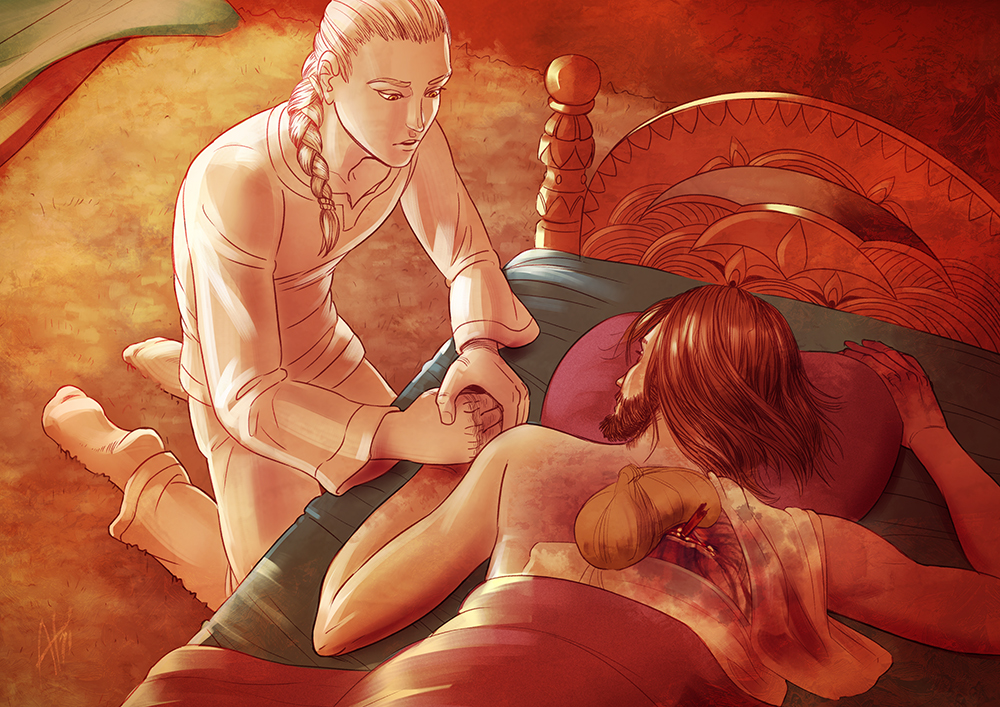Read the previous entry in the series here.
Read the next entry in the series here.
The following chapter, “Jhaampe,” opens with a description of the titular city, one familiar from earlier. It passes after to Fitz proceeding deliriously under Nighteyes’s guidance to a dimly glimpsed figure who takes him.

Awakening by Atrika on DeviantArt, here, used for commentary
Fitz wakes intermittently as the figure who took him and others tend to his injuries, which range to frostbite in addition to the arrow wound and overall fatigue and ill treatment. As Fitz assesses himself and returns to his senses, he asks about his situation. He recognizes the Fool as he slips back out of and into consciousness, and the two exchange tidings as best they are able at the time. Among those tidings is that the child Kettricken had carried when she fled Buckkeep was stillborn, and she has mourned Verity as dead, but the Fool notes that Fitz’s emergence has provided new hope to him. Chade has been at work, as has Patience, but matters remain grim, and there has been no sign of Starling or of Kettle that the Fool knows of.
Fitz asks the Fool not to report his survival to Kettricken or Chade. The Fool reluctantly agrees, and the two begin to fall back into their old amity and ease, despite the pain.
In the chapter, the Fool makes one of his wryer comments about Fitz in response to being addressed as a revered figure: “‘Holy one?’ There was bitter humor in [the Fool’s] voice. ‘If you would speak of holes, you should speak of him, not me. Here, look at his back.'” There is a part of me, one steeped in the humorous writings of the past, one that looks for sometimes-subtle bits of wordplay such as this, that wonders if the previous chapter’s action, hunting and shooting Fitz, was plotted out for no other purpose than to make the pun in the Fool’s comment. Hobb borrows from Asimov throughout the series, as noted here, and Asimov several times wrote pieces specifically to put puns across–such stories as “About Nothing,” “Death of a Foy,” and “Sure Thing” in The Winds of Change and Other Stories come to mind as examples–so it is not outside the realm of possibility that another such borrowing has taken place in the present chapter. Whether intended or not, it does seem a useful setup for such a joke.
More broadly, I’ve argued that Hobb borrows freely from fools in Shakespeare in informing her own Fool, and the kind of word-play evidenced by the Fool in the present example is decidedly present in Shakespeare, both from “fools” and from other jokesters. Mercutio’s comment that calling on him the day after he is stabbed will find him “a grave man” is but one easily accessed example, while no few of Benedick’s remarks in Much Ado about Nothing are of similar sort, and even Othello‘s Iago expounds similarly. It may seem a strange thing to have the kind of pun at work that is at work in the chapter, but if it is strange, it is a strangeness with no small precedent.
[…] Read the previous entry in the series here. Read the next entry in the series here. […]
LikeLike
[…] the previous entry in the series here. Read the next entry in the series […]
LikeLike
[…] of his youth. The needs of the kingdom take him to the Chyurda and Jhaampe, and he sees again the house where the Fool had dwelt in that city. The sight puts him to musing on his past once again, and Fitz confers with one who had known the […]
LikeLike